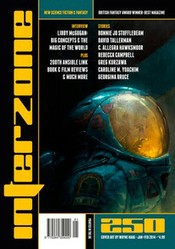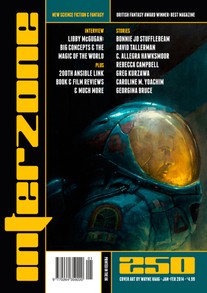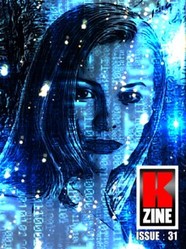Bonnie Jo Stufflebeam, David Tallerman, C Allegra Hawksmoor, Caroline M Yoachim, Greg Kurzawa, Rebecca Campbell and Georgina Bruce provide the fiction in the landmark 250th issue of science-fiction and fantasy magazine Interzone. Libby McGugan is interviewed about her first novel. Tony Lee and Nick Lowe tackle the film and TV section. And David Langford gives us his 200th Ansible Link column.

Interzone 250: Review of January-February 2014 Issue
The January-February 2014 issue of Interzone mixes science-fiction, fantasy, horror and comedy in its seven short stories. Steve Rogerson reviews the selection.
Many publications would celebrate their 250th issue with bangs and whistles. Not so Interzone. In its own laid-back style, it acknowledged this landmark near the end of an editorial bemoaning the lack of originality in science-fiction films. That the issue also contained the 200th edition of David Langford’s excellent Ansible Link column was similarly mentioned in passing, though on the actual column the point was made in larger type. Such modesty is typical of a publication that quietly strives and succeeds in bringing to our eyes some of the most ground-breaking short stories around.
The stories in this issue of the science-fiction and fantasy magazine (number 250, TTA Press, ISSN 0264-3596) succeed in amusing, scaring and astonishing readers in almost equal measure.
“The damaged” by Bonnie Jo Stufflebeam
Robin makes robots. Well, at least some of the insides of robots, which is why she is curious to find the reason some go wrong. Or is there more to that, to why she collects them from the subway and takes them back to her bed? This is a cracking mix of science and emotion, well told in a way that makes you wish there was more of it.
“Bad times to be in the wrong place” by David Tallerman
When strangers arrive at the diner, a casual conversation changes the life of the young man drinking coffee alone, brooding over the row he’d just had with his partner. This is a touch comedy, a touch philosophy, but a very short touch, yet one that keeps your thoughts turning nonetheless.
“The labyrinth of thorns” by C Allegra Hawksmoor
Those who get annoyed by unsolicited Bluetooth requests hitting their mobiles will appreciate this story of a man sent to infiltrate a rebel group in a futuristic city. They’ve put a memory in his mind to test him, and this is the labyrinth of the title. Hawksmoor’s vivid description of this world is tremendous as she navigates the man’s journey through reality and something else.
“Beneath the willow branches” by Caroline M Yoachim
Laura’s brain was stuck in a time loop so Takeshi Saito decided to go back in time to break her out. But what was to stop him being trapped as well? Slightly confusing at times, but in a way that seems almost deliberate, this is as much a love story as of consciousnesses travelling in time. Both sides mingle with the characters, and you can’t help being pulled into his quest.
“Predvestniki” by Greg Kurzawa
Ben and Myra are in Moscow; Myra is there for work and Ben along for the ride, but he becomes intrigued by a tower he can see from their apartment window. Myra’s lack of interest frustrates him, especially when more towers appear and somethings seem to be wakening in their domes. And why have people very pointy teeth? This is a horror story. Viewed through Ben’s eyes, we share his growing worries and fears. The author also has a very readable writing style; he tells a good story.
“Lilacs and daffodils” by Rebecca Campbell
I didn’t get this, so I read it again. This is an uploaded consciousness trying to access and understand its memories from when it was a little girl. But the thoughts are disjointed, they are missing bits. The consciousness wants order, so it tries to order the thoughts. The result is funny. I’m glad I spent time rereading this, because now I get it and I like it.
“Wake up, Phil” by Georgina Bruce
Serberus and Callitrix – the two big organisations run the world and are at war with each other. Laura works for one of them, but she struggles to remember which, a possible side effect of the Serberitum slimming pills. Or was it the Callitaxor? All she really wanted was a puppy. This Big Brother style story succeeds in being both funny and confusing, but very readable.
Also in Interzone 250
Libby McGugan is interviewed by Paul Cockburn on the launch of her debut novel The Eidolon. The ease with which she appears to have got it published will probably have many a would-be novelist banging their heads on the table.
This leads into this month’s batch of book reviews; Dream London by Tony Ballantyne sounds tempting – I like books set in London, and this looks a good one. The intermission between books and the TV and film releases is filled by Jonathan McCalmont’s column, my general dislike of which has been mentioned in previous reviews. I got half way through this one before I gave up through boredom. I think I’ll just miss it out in future issues.
Tony Lee performs his normal thorough analysis of the latest DVD releases, and this time there is a bonus – a chance to win a Game of Thrones season three boxset. Sadly for me it is Bluray and I’m still stuck in a normal DVD world.
Nick Lowe tackles the more recent releases, and I enjoyed his comments on the Carrie remake. The original is one of my all-time favourite films and so I can’t quite build up the courage to see the new version, but I still enjoy reading about it.
And so that’s it. Nothing spectacular to mark the anniversary, just the usual high-quality mix of fiction and information that has seen this magazine through 250 issues. Let’s hope there is still a lot more to come.
You might also like
KZine Issue 31: Review of October 2021 IssueSteve Rogerson reviews the thirty-first issue of the Kindle science-fiction, ...
KZine Issue 30: Review of June 2021 IssueSteve Rogerson reviews the thirtieth issue of the Kindle science-fiction, fan...







 KZine Issue 31: Review of October 2021 Issueon 11/07/2021
KZine Issue 31: Review of October 2021 Issueon 11/07/2021
 KZine Issue 30: Review of June 2021 Issueon 07/05/2021
KZine Issue 30: Review of June 2021 Issueon 07/05/2021
 KZine Issue 29: Review of February 2021 Issueon 02/23/2021
KZine Issue 29: Review of February 2021 Issueon 02/23/2021
 KZine Issue 28: Review of September 2020 Issueon 10/01/2020
KZine Issue 28: Review of September 2020 Issueon 10/01/2020



Comments
SteveRogerson, Thank you for practical information, pretty pictures and product lines.
Predvestniki most intrigues me even as Bad Times, Damaged and Labyrinth of Thorns interest me.
Has the typical reaction to Lilacs and Daffodils been like yours, in confusion the first time forcing a second-time reading that is likable and understandable?